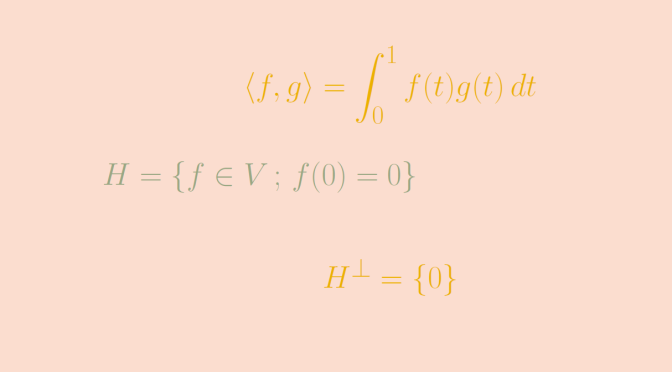We consider an inner product space \(V\) over the field of real numbers \(\mathbb R\). The inner product is denoted by \(\langle \cdot , \cdot \rangle\).
When \(V\) is a finite dimensional space, every proper subspace \(F \subset V\) has an orthogonal complement \(F^\perp\) with \(V = F \oplus F^\perp\). This is no more true for infinite dimensional spaces and we present here an example.
Consider the space \(V=\mathcal C([0,1],\mathbb R)\) of the continuous real functions defined on the segment \([0,1]\). The bilinear map
\[\begin{array}{l|rcl}
\langle \cdot , \cdot \rangle : & V \times V & \longrightarrow & \mathbb R \\
& (f,g) & \longmapsto & \langle f , g \rangle = \displaystyle \int_0^1 f(t)g(t) \, dt \end{array}
\] is an inner product on \(V\).
Let’s consider the proper subspace \(H = \{f \in V \, ; \, f(0)=0\}\). \(H\) is an hyperplane of \(V\) as \(H\) is the kernel of the linear form \(\varphi : f \mapsto f(0)\) defined on \(V\). \(H\) is a proper subspace as \(\varphi\) is not always vanishing. Let’s prove that \(H^\perp = \{0\}\).
Take \(g \in H^\perp\). By definition of \(H^\perp\) we have \(\int_0^1 f(t) g(t) \, dt = 0\) for all \(f \in H\). In particular the function \(h : t \mapsto t g(t)\) belongs to \(H\). Hence
\[0 = \langle h , g \rangle = \displaystyle \int_0^1 t g(t)g(t) \, dt\] The map \(t \mapsto t g^2(t)\) is continuous, non-negative on \([0,1]\) and its integral on this segment vanishes. Hence \(t g^2(t)\) is always vanishing on \([0,1]\), and \(g\) is always vanishing on \((0,1]\). As \(g\) is continuous, we finally get that \(g = 0\).
\(H\) doesn’t have an orthogonal complement.
Moreover we have
\[(H^\perp)^\perp = \{0\}^\perp = V \neq H\]

